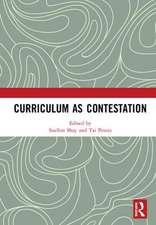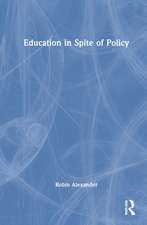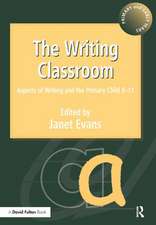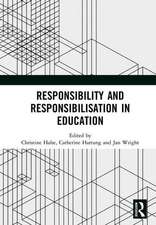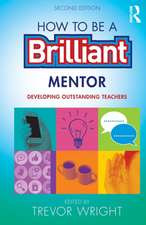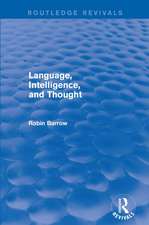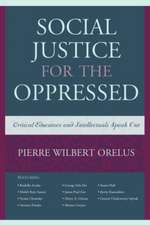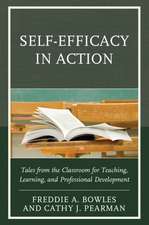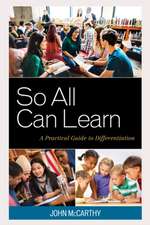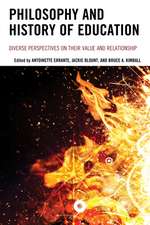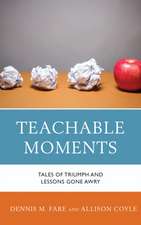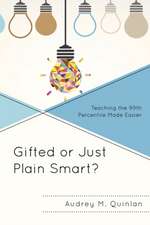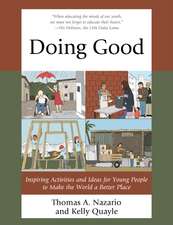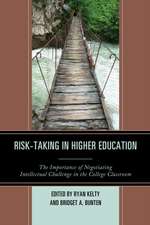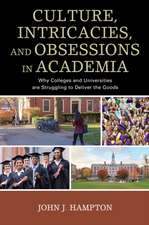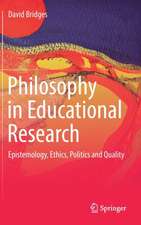Video-based Research in Education: Cross-disciplinary Perspectives
Editat de Lihua Xu, George Aranda, Wanty Widjaja, David Clarkeen Limba Engleză Paperback – 2 noi 2018
This book explores the ontological, epistemological, methodological, and ethical challenges associated with the different uses of video in research, ranging from video as a tool for investigating social interactions and for stimulating participants’ reflection, to the use of video for engaging varied communities and social groups in the process of teaching, learning and research. Each chapter presents the authors’ critical reflection on the ways in which video was employed, the research decisions made, the methodological challenges faced, and the consequences for how educational practices were understood. As such, it illustrates a wide range of philosophical and theoretical standpoints with respect to video-based research approaches.
This book will stimulate broad and rich discussion among education researchers who are interested in video research and contributes to: advancing knowledge of the field; developing approaches to dealing with emergent ethical, theoretical, and methodological issues; and generating new protocols and guidelines for conducting video-based research across a variety of disciplinary areas in education.
| Toate formatele și edițiile | Preț | Express |
|---|---|---|
| Paperback (1) | 360.72 lei 43-57 zile | |
| Taylor & Francis – 2 noi 2018 | 360.72 lei 43-57 zile | |
| Hardback (1) | 1000.27 lei 43-57 zile | |
| Taylor & Francis – 6 noi 2018 | 1000.27 lei 43-57 zile |
Preț: 360.72 lei
Nou
Puncte Express: 541
Preț estimativ în valută:
69.05€ • 75.02$ • 58.04£
69.05€ • 75.02$ • 58.04£
Carte tipărită la comandă
Livrare economică 21 aprilie-05 mai
Preluare comenzi: 021 569.72.76
Specificații
ISBN-13: 9781138089457
ISBN-10: 1138089451
Pagini: 302
Ilustrații: 16 Tables, black and white; 14 Line drawings, black and white; 24 Halftones, black and white; 38 Illustrations, black and white
Dimensiuni: 156 x 234 x 16 mm
Greutate: 0.56 kg
Ediția:1
Editura: Taylor & Francis
Colecția Routledge
Locul publicării:Oxford, United Kingdom
ISBN-10: 1138089451
Pagini: 302
Ilustrații: 16 Tables, black and white; 14 Line drawings, black and white; 24 Halftones, black and white; 38 Illustrations, black and white
Dimensiuni: 156 x 234 x 16 mm
Greutate: 0.56 kg
Ediția:1
Editura: Taylor & Francis
Colecția Routledge
Locul publicării:Oxford, United Kingdom
Public țintă
Postgraduate and ProfessionalCuprins
List of Figures and Tables
Introduction
Section I: The Roles of Video in Education Research
Section Overview Wanty Widjaja, Gaye Williams, and David Clarke
1. The Use of Video in Classroom Research: Window, Lens, or Mirror David Clarke and Man Ching Esther Chan
2. Validity and Comparability in Cross-cultural Video Studies of Classrooms Lihua Xu and David Clarke
3. A Video Study of Quality Teaching and Learning in Three Countries Russell Tytler, Hsian-Lan Sharon Chen, Mark Hackling, and Jörg Ramseger
4. Potential and Challenges in Examining Teachers’ Metacognitive Instructional Strategies Using Video Technology Lee Ngan Hoe, Ng Kit Ee Dawn, Cynthia Seto, and Loh Mei Yoke
5. Examining Primary School Teachers’ Professional Noticing Through a Video-Based Methodology Wanty Widjaja, Lihua Xu, and Wendy Jobling
6. Critical Videographic Research Methods: Researching Teacher’s Lives and Work Post ‘9/11’ Matthew Krehl Edward Thomas and Julianne Moss
Section II: Video as a Tool for Capturing and Understanding Complexity of Teaching and Learning
Section Overview Lihua Xu, Russell Tytler, and Louise Paatsch
7. Video-Based Research in a Laboratory Classroom: Connecting Learning to Classroom Interactions Man Ching Esther Chan and David Clarke
8. Video Research: Purposeful Selection From Rich Data Sets Joseph Ferguson, George Aranda, Russell Tytler, and Radhika Gorur
9. The Use of Video-based Ethnography in an Inquiry-based Blended Science Classroom Connie Cirkony and Peter Hubber
10. Characterisation of the Didactic Contract Using the Video of the Classroom as Primary Data Andrée Tiberghien and Patrice Venturini
11. The Use of Recurrent Gestures to Give Cohesion to Classroom Discourse Eduardo F. Mortimer, Renata Reis Pereira, and Luciana Moro
12. Re/active Documentary: An Artefact of Dynamic Force Melissa Joy Wolfe
Section III: Video as a Tool for Reflection on Practice in Teaching and Learning
Section Overview George Aranda, Linda Hobbs, and John Cripps-Clark
13. Using Video-Stimulated Interviews to Foster Reflection, Agency and Knowledge-Building in Research Maria Nicholas, Louise Paatsch, and Andrea Nolan
14. Video as a Second Stimulus in Developing the Professional Agency of Primary Pre-service Teachers John Cripps Clark, Gail Chittleborough, and Paul Chandler
15. Using Self-captured Video to Support Reflective Practice in Teacher Professional Learning Communities Peter Hubber, Peta White, and Amanda Berry
16. Preparing Teachers for Reform-oriented Teaching Using the Thematic Approach of Re-viewing Videos Valerie Wing Yan Yip, Kennedy Kam Ho Chan, Benny Hin Wai Yung, and Ching Lai
List of contributors
Index
Introduction
Section I: The Roles of Video in Education Research
Section Overview Wanty Widjaja, Gaye Williams, and David Clarke
1. The Use of Video in Classroom Research: Window, Lens, or Mirror David Clarke and Man Ching Esther Chan
2. Validity and Comparability in Cross-cultural Video Studies of Classrooms Lihua Xu and David Clarke
3. A Video Study of Quality Teaching and Learning in Three Countries Russell Tytler, Hsian-Lan Sharon Chen, Mark Hackling, and Jörg Ramseger
4. Potential and Challenges in Examining Teachers’ Metacognitive Instructional Strategies Using Video Technology Lee Ngan Hoe, Ng Kit Ee Dawn, Cynthia Seto, and Loh Mei Yoke
5. Examining Primary School Teachers’ Professional Noticing Through a Video-Based Methodology Wanty Widjaja, Lihua Xu, and Wendy Jobling
6. Critical Videographic Research Methods: Researching Teacher’s Lives and Work Post ‘9/11’ Matthew Krehl Edward Thomas and Julianne Moss
Section II: Video as a Tool for Capturing and Understanding Complexity of Teaching and Learning
Section Overview Lihua Xu, Russell Tytler, and Louise Paatsch
7. Video-Based Research in a Laboratory Classroom: Connecting Learning to Classroom Interactions Man Ching Esther Chan and David Clarke
8. Video Research: Purposeful Selection From Rich Data Sets Joseph Ferguson, George Aranda, Russell Tytler, and Radhika Gorur
9. The Use of Video-based Ethnography in an Inquiry-based Blended Science Classroom Connie Cirkony and Peter Hubber
10. Characterisation of the Didactic Contract Using the Video of the Classroom as Primary Data Andrée Tiberghien and Patrice Venturini
11. The Use of Recurrent Gestures to Give Cohesion to Classroom Discourse Eduardo F. Mortimer, Renata Reis Pereira, and Luciana Moro
12. Re/active Documentary: An Artefact of Dynamic Force Melissa Joy Wolfe
Section III: Video as a Tool for Reflection on Practice in Teaching and Learning
Section Overview George Aranda, Linda Hobbs, and John Cripps-Clark
13. Using Video-Stimulated Interviews to Foster Reflection, Agency and Knowledge-Building in Research Maria Nicholas, Louise Paatsch, and Andrea Nolan
14. Video as a Second Stimulus in Developing the Professional Agency of Primary Pre-service Teachers John Cripps Clark, Gail Chittleborough, and Paul Chandler
15. Using Self-captured Video to Support Reflective Practice in Teacher Professional Learning Communities Peter Hubber, Peta White, and Amanda Berry
16. Preparing Teachers for Reform-oriented Teaching Using the Thematic Approach of Re-viewing Videos Valerie Wing Yan Yip, Kennedy Kam Ho Chan, Benny Hin Wai Yung, and Ching Lai
List of contributors
Index
Notă biografică
Lihua Xu is Lecturer in Science Education at Deakin University. With more than 10 years experience of video research in classroom settings, her research focuses on understanding the complexity of teaching and learning in classrooms situated in East Asian and Western cultural contexts.
George Aranda is Lecturer in Science Education at Deakin University with broad interests including video-based research in science education, technology education, coding, gaming, neuroscience and science communication.
Wanty Widjaja is Senior Lecturer in Mathematics Education at Deakin University. Her research interests include mathematical modelling, design-based research, professional noticing, Realistic Mathematics, Lesson Study, STEM Interdisciplinary and video-based research methodology.
David Clarke is Professor at the University of Melbourne and Director of the International Centre for Classroom Research (ICCR). Over the last 20 years, his research activity has centred on capturing the complexity of classroom practice through a program of international video-based classroom research.
George Aranda is Lecturer in Science Education at Deakin University with broad interests including video-based research in science education, technology education, coding, gaming, neuroscience and science communication.
Wanty Widjaja is Senior Lecturer in Mathematics Education at Deakin University. Her research interests include mathematical modelling, design-based research, professional noticing, Realistic Mathematics, Lesson Study, STEM Interdisciplinary and video-based research methodology.
David Clarke is Professor at the University of Melbourne and Director of the International Centre for Classroom Research (ICCR). Over the last 20 years, his research activity has centred on capturing the complexity of classroom practice through a program of international video-based classroom research.
Recenzii
Anna Sfard, Professor, Education, The University of Haifa
The use of video is widespread these days both in research and in teacher training. In terms of extent and intensity the actual use is well ahead of any theoretical considerations regarding the epistemological/ontological underpinnings of this or of its outcomes. Books that reflect on this use are urgently needed. The book is quite universal in its theme and has an international authorship (admittedly, with Australian majority). David Clarke, the most senior of the editors, is one of the best known, most highly esteemed and most productive members of the international community of learning sciences coming from mathematics education. In particular, he has an impressive record of creating international research networks and of book writing and editing. In result, he has years of experience in collecting and analysing video-recorded data from all over the world. The two other editors are young and promising as scholars. The team, as a whole, may be trusted to do a good job. The applications of the cutting-edge video technology (as well as means for working with video recordings) and the wideness of the perspective and of domains of application seem to be the particular strengths of this book. Also, the different chapters build on the rich experience and theoretical considerations collected so far and thus make an important contribution, well beyond what has been said on the topic in the past.
Gabriele Kaiser, Professor, University of Hamburg, Germany
As the possible editors have pointed out in their description research based on video is strongly and rapidly growing research field all over the world. It has become of high relevance, because it allows deep insight into classrooms or other research fields. The advantages of video compared to research with other observational instruments are its replicability, which allows more valid scientific results. Due to the wide applicability of video-based research in nearly all educational fields, there is a strong need for a book describing the possibilities and limitations of video-based research. The book has as strong advantage that it is an edited book with collected papers covering many areas of research expertise and tackling the theme video-based research from several broad perspectives, especially from a methodological point of view.
Fritjof Sahlström, Professor, Åbo Akademi University, Finland
Editor’s response: The team does not feel there is a need to include an additional chapter on screen-mediated sociality. While there are certainly some interesting research in this area, we do not feel this is a really significant missing aspect of video research or a gap as such. The intention was not to "cover" the subject of video use but rather to provide points of view on the use of video, present a selection of ways to do this and offer examples of actual use. Both Reviewer 1 and 2 felt the scope of the book is satisfactory and appropriate and we also noted Reviewer 1’s comment that the broadness of the perspectives chosen has the potential to turn the book into a handbook for video-based research. This indicates that the coverage of the book is appropriate in its current form.
For the present-day educational researcher, the video camera is what the newly invented microscope was for the 17thcentury scientist: an instrument for discovering new worlds. This book will make the reader aware of the video’s power to disclose the hitherto unnoticed understandings, sensibilities, and prejudices that reside in the minuscule building blocks of our actions. Since it is through these highly-loaded but almost never reflected-upon little moves that we make even the biggest things happen, watching the world though camera lenses means rewriting the traditional stories of teaching and learning and, in fact, revolutionizing our vision of all human actions. The multi-vocal, multi-perspectival reflection on the video-assisted storytelling to be found in this volume will open the reader's eyes to the depth and breadth of this change and to its numerous gains and challenges. This book should therefore be of interest to anybody who seeks improvement in either educational research or practice.
Professor Anna Sfard, Department of Mathematics Education, University of Haifa
The use of video is widespread these days both in research and in teacher training. In terms of extent and intensity the actual use is well ahead of any theoretical considerations regarding the epistemological/ontological underpinnings of this or of its outcomes. Books that reflect on this use are urgently needed. The book is quite universal in its theme and has an international authorship (admittedly, with Australian majority). David Clarke, the most senior of the editors, is one of the best known, most highly esteemed and most productive members of the international community of learning sciences coming from mathematics education. In particular, he has an impressive record of creating international research networks and of book writing and editing. In result, he has years of experience in collecting and analysing video-recorded data from all over the world. The two other editors are young and promising as scholars. The team, as a whole, may be trusted to do a good job. The applications of the cutting-edge video technology (as well as means for working with video recordings) and the wideness of the perspective and of domains of application seem to be the particular strengths of this book. Also, the different chapters build on the rich experience and theoretical considerations collected so far and thus make an important contribution, well beyond what has been said on the topic in the past.
Gabriele Kaiser, Professor, University of Hamburg, Germany
As the possible editors have pointed out in their description research based on video is strongly and rapidly growing research field all over the world. It has become of high relevance, because it allows deep insight into classrooms or other research fields. The advantages of video compared to research with other observational instruments are its replicability, which allows more valid scientific results. Due to the wide applicability of video-based research in nearly all educational fields, there is a strong need for a book describing the possibilities and limitations of video-based research. The book has as strong advantage that it is an edited book with collected papers covering many areas of research expertise and tackling the theme video-based research from several broad perspectives, especially from a methodological point of view.
Fritjof Sahlström, Professor, Åbo Akademi University, Finland
- Is there a real need for this book?
- Is the author a recognised authority in this field?
- Is the book’s coverage of the subject adequate and appropriate to the level aimed at?
Editor’s response: The team does not feel there is a need to include an additional chapter on screen-mediated sociality. While there are certainly some interesting research in this area, we do not feel this is a really significant missing aspect of video research or a gap as such. The intention was not to "cover" the subject of video use but rather to provide points of view on the use of video, present a selection of ways to do this and offer examples of actual use. Both Reviewer 1 and 2 felt the scope of the book is satisfactory and appropriate and we also noted Reviewer 1’s comment that the broadness of the perspectives chosen has the potential to turn the book into a handbook for video-based research. This indicates that the coverage of the book is appropriate in its current form.
For the present-day educational researcher, the video camera is what the newly invented microscope was for the 17thcentury scientist: an instrument for discovering new worlds. This book will make the reader aware of the video’s power to disclose the hitherto unnoticed understandings, sensibilities, and prejudices that reside in the minuscule building blocks of our actions. Since it is through these highly-loaded but almost never reflected-upon little moves that we make even the biggest things happen, watching the world though camera lenses means rewriting the traditional stories of teaching and learning and, in fact, revolutionizing our vision of all human actions. The multi-vocal, multi-perspectival reflection on the video-assisted storytelling to be found in this volume will open the reader's eyes to the depth and breadth of this change and to its numerous gains and challenges. This book should therefore be of interest to anybody who seeks improvement in either educational research or practice.
Professor Anna Sfard, Department of Mathematics Education, University of Haifa
Descriere
Video-based Research in Education is a timely and significant collection exploring different uses of video in educational research, ranging from the use of video in investigating social interactions and stimulating participants’ reflection, to engaging different social groups in the process of teaching, learning and research.

